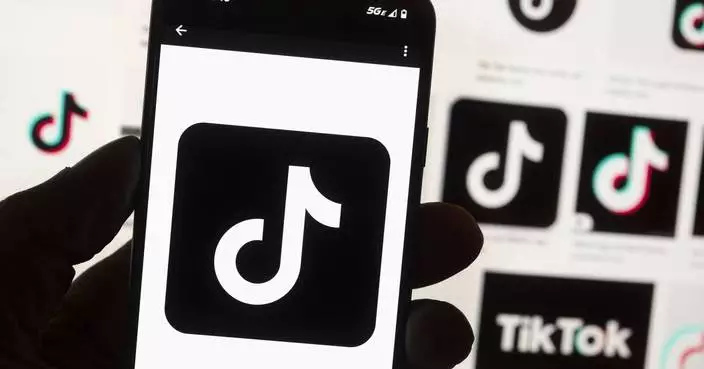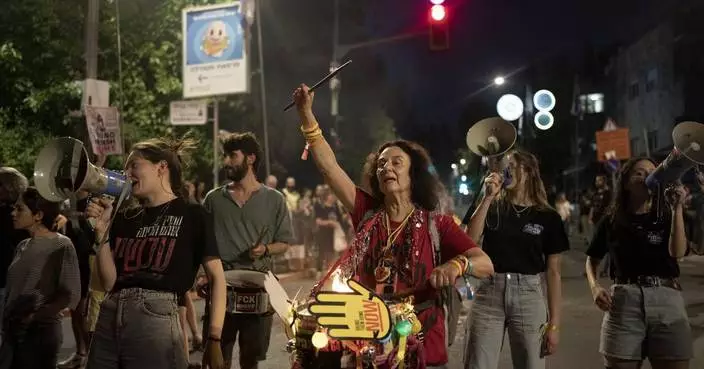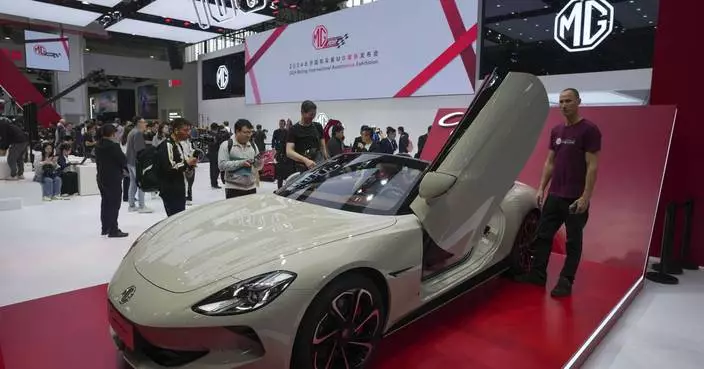China sentenced a Taiwanese activist to five years in prison Tuesday for holding online political lectures and helping the families of jailed dissidents in a conviction demonstrating how Beijing's harshest crackdown on human rights in decades has extended beyond the Chinese mainland.
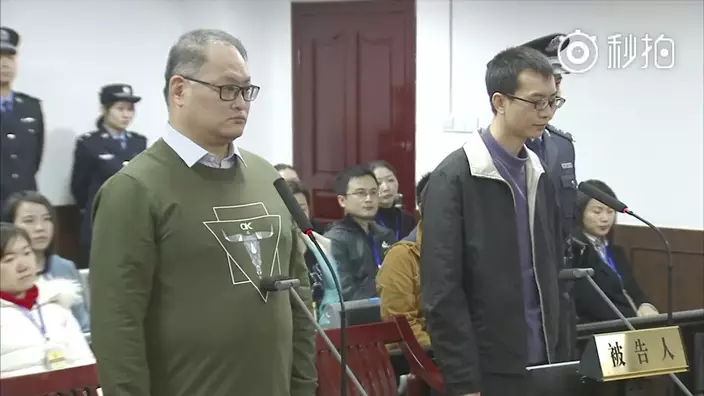
In this image taken from video released on Nov. 28, 2017, by the Intermediate People's Court of Yueyang, Taiwanese activist Lee Ming-che, left, and his fellow defendant Peng Yuhua of China stand during a court session at the Intermediate People's Court of Yueyang in Yueyang in central China's Hunan Province, Tuesday, Nov. 28, 2017. (Intermediate People's Court of Yueyang via AP Video)
The trial of Lee Ming-che was also China's first known criminal prosecution of a nonprofit group worker since Beijing passed a law last year tightening controls over foreign nongovernmental organizations.
The Yueyang City Intermediate People's Court in central China handed down the sentence against Lee after finding him guilty of subversion of state power. Lee had confessed during his trial in September, which his wife, Lee Ching-yu, dismissed as "a political show."
Lee's co-defendant, Peng Yuhua, who is from mainland China, was sentenced to seven years in prison. Peng had also pleaded guilty, saying he had founded an organization called Palm Flower Co. to pressure China to accept a multiparty political system and that Lee was his deputy in charge of education.
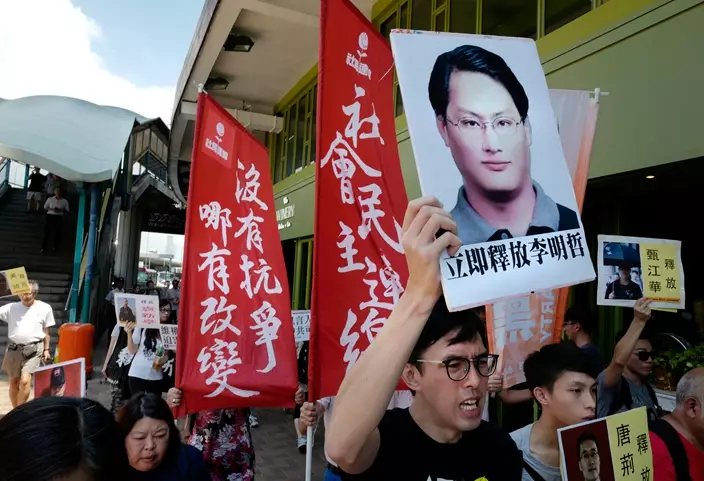
FILE - In this Sept. 11, 2017, file photo, a protester raises a picture of Taiwanese activist Lee Ming-che during a demonstration outside the Chinese liaison office in Hong Kong. A Chinese court on Tuesday, Nov. 28, 2017, has sentenced to five years in prison the Taiwanese activist who conducted online lectures on Taiwan's democratization and managed a fund for families of political prisoners in China. (AP Photo/Vincent Yu, File)
Lee's wife attended the sentencing. "A price must be paid in the pursuit of an ideal," she said in a statement issued through her supporters. "Striving for human rights for the underprivileged is a necessary dedication to promoting the progress of human civilization."
Supporters say that since the trial ended, Lee Ching-yu has been prevented from leaving her hotel room or meeting with anyone. Calls to her cellphone rang unanswered.
"Lee Ming-che took the risk despite knowing the dangers," she said, adding that she was proud of him.
Subversion of state power is a vaguely defined charge often used by Chinese authorities to muzzle dissent and imprison critics. Both men said they would not appeal.
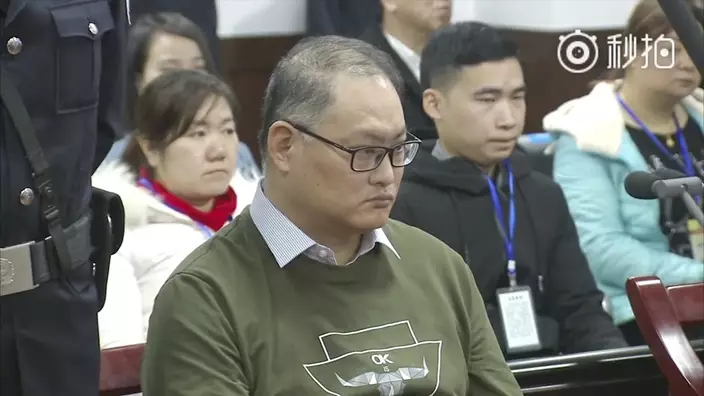
In this image taken from video released on Nov. 28, 2017, by the Intermediate People's Court of Yueyang, Taiwanese activist Lee Ming-che sits during a court session at the Intermediate People's Court of Yueyang in Yueyang in central China's Hunan Province, Tuesday, Nov. 28, 2017. (Intermediate People's Court of Yueyang via AP Video)
Taiwan, a self-governing island Beijing regards as part of Chinese territory, swiftly condemned the sentence.
"The spread of democratic ideas is innocent!" Alex Huang, the spokesman for Taiwanese President Tsai Ing-wen, said in a statement. Huang urged Beijing to release Lee as soon as possible and allow him to return to Taiwan.
"We cannot accept that Lee Ming-che has been convicted of 'state subversion' for sharing ideas of freedom and democracy out of concern for the development of mainland China's civil society and democracy," the statement said.
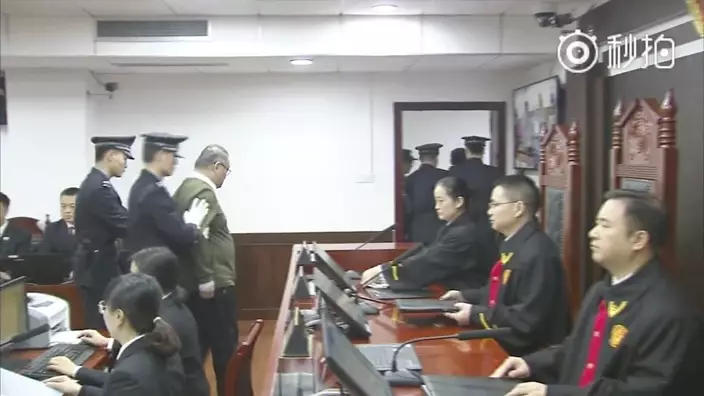
In this image taken from video released on Nov. 28, 2017 by the Intermediate People's Court of Yueyang, Taiwanese activist Lee Ming-che is escorted out after a court session at the Intermediate People's Court of Yueyang in Yueyang in central China's Hunan Province, Tuesday, Nov. 28, 2017. (Intermediate People's Court of Yueyang via AP Video)
Taiwan's Cabinet-level Mainland Affairs Council said in a statement that it would not accept the verdict and that the government would continue working to secure Lee's release from China.
Lee Ming-che, 42, cleared immigration in the semi-autonomous Chinese territory of Macau on March 19 and never showed up for a planned meeting later that day with a friend in the mainland Chinese city of Zhuhai.
He had previously conducted online lectures on Taiwan's democratization and managed a fund for families of political prisoners in China.
Lee's sentence was "incredibly harsh," given the accusations against him and the lack of evidence, said Maya Wang, Human Rights Watch's Hong Kong-based researcher.
"It's probably designed as a warning to activists based outside China, particularly those in Hong Kong and Taiwan," as Chinese President Xi Jinping's crackdown on dissent radiates beyond its borders, Wang said in an email.
In Taiwan, Lee's sentence was met with condemnation and worries about China's cross-border reach.
"This tells all Taiwanese people that this is China's threat. This is also a threat from China to all NGO workers in the world," said Cheng Hsiu-chuan, principal of Taipei Wenshan Community College, where Lee worked as an administrator.
"China is warning us that even if you are not within Chinese territory, it can incriminate you if you go to China," Cheng said.
Lisa Lin, a 20-year-old university student, said the case displays the contrast between China's repressive system and Taiwan's democratic freedoms.
"I think this is not very good because everyone should have the right to express their opinions," Lin said.
China's wide-ranging crackdown on civil society has featured a string of televised "confessions" — believed to have been coerced — from human rights activists accused of plotting to overthrow the political system.
The new law passed in April 2016 says foreign nongovernmental organizations must not endanger China's national security and ethnic unity, and places nonprofit groups under close police supervision. It is seen as an attempt to clamp down on perceived threats to the ruling Communist Party's control.
Relations between Taiwan and China have been near an all-time low since the election of Tsai, whose party has advocated Taiwan's formal independence. China cut off contacts with Taiwan's government in June of last year, five months after Tsai was elected.
LONDON (AP) — TikTok is in the crosshairs of authorities in the U.S., where new legislation threatens a nationwide ban unless its China-based parent ByteDance divests. It would be the biggest blow yet to the popular video-sharing app, which has faced various restrictions around the world.
TikTok is already banned in a handful of countries and from government-issued devices in a number of others, due to official worries that the app poses privacy and cybersecurity concerns.
Those fears are reflected in the U.S. bill, which is the culmination of long-held bipartisan fears in Washington that China’s communist leaders could force ByteDance to hand over U.S. user data, or influence Americans by suppressing or promoting certain content. TikTok has long maintained that it doesn’t share data with the Chinese government and its CEO has taken a defiant stance, vowing to fight back.
Here are the places that have partial or total bans on TikTok:
AFGHANISTAN
TikTok has been banned since 2022, along with videogame PUBG, after the country's Taliban leadership decided to forbid access on the grounds of protecting young people from “being misled.”
AUSTRALIA
TikTok is not allowed on devices issued by the Australian federal government. Attorney-General Mark Dreyfus said he made the decision after getting advice from the country’s intelligence and security agencies.
BELGIUM
The National Security Council decided last month to indefinitely ban TikTok from devices owned or paid for by the federal government. The ban was issued on a temporary basis last year on worries about cybersecurity, privacy and misinformation. Prime Minister Alexander de Croo said it was based on warnings from the country’s state security service and cybersecurity center.
CANADA
Devices issued by the federal government are forbidden from using TikTok. Officials cited an “unacceptable” risk to privacy and security and said the app would be removed from devices and employees blocked from downloading it.
DENMARK
Denmark’s Defense Ministry banned its employees from having TikTok on their work phones, ordering staffers who have installed it to remove the app from devices as soon as possible. The ministry said the reasons for the ban included both “weighty security considerations” as well as “very limited work-related need to use the app.”
EUROPEAN UNION
The European Parliament, European Commission and the EU Council, the 27-member bloc’s three main institutions, have imposed bans on TikTok on staff devices. Under the European Parliament’s ban, lawmakers and staff were also advised to remove the TikTok app from their personal devices.
FRANCE
“Recreational” use of TikTok and other social media apps like Twitter and Instagram on government employees’ phones has been banned because of worries about insufficient data security measures. The French government didn’t name specific apps but noted the decision came after other governments took measures targeting TikTok.
INDIA
India imposed a nationwide ban on TikTok and dozens of other Chinese apps like messaging app WeChat in 2020 over privacy and security concerns. The ban came shortly after a clash between Indian and Chinese troops at a disputed Himalayan border killed 20 Indian soldiers and injured dozens. The companies were given a chance to respond to questions on privacy and security requirements but the ban was made permanent in 2021.
INDONESIA
TikTok isn't entirely banned in the sprawling, populous Southeast Asian nation, only its online retail function, after the authorities clamped down on e-commerce transactions carried out on social media platforms in a bid to protect small businesses.
LATVIA
Foreign Minister Edgars Rinkevics tweeted that he deleted his TikTok account and that the app is also prohibited from official foreign ministry smartphones.
NETHERLANDS
The Dutch central government banned apps including TikTok from employee work phones citing data security concerns. A government statement did not name TikTok specifically but said civil servants are discouraged from having apps “from countries with an offensive cyber program against the Netherlands and/or Dutch interests installed and used on their mobile work devices.”
NEPAL
The Himalayan country imposed a nationwide ban on TikTok, saying it was disrupting “social harmony” and goodwill and blaming it for a “flow of indecent materials.” Authorities ordered the telecom company to block access to the app.
NEW ZEALAND
Lawmakers in New Zealand and staff at the nation’s Parliament are prohibited from having the TikTok app on their work phones, following advice from government cybersecurity experts. The app was removed from all devices with access to the parliamentary network, although officials can make special arrangements for anybody who needs TikTok to perform their democratic duties.
NORWAY
The Norwegian parliament banned Tiktok on work devices after the country’s Justice Ministry warned the app shouldn’t be installed on phones issued to government employees. The Parliament’s speaker said TikTok shouldn’t be on devices that have access to the assembly’s systems and should be removed as quickly as possible. The country’s capital Oslo and second largest city Bergen also urged municipal employees to remove TikTok from their work phones.
PAKISTAN
Pakistani authorities have temporarily banned TikTok at least four times since 2020, citing concerns that the app promotes immoral content.
SOMALIA
The government ordered telecom companies to block access to TikTok, along with messaging app Telegram and gambling platform 1XBET. Officials said they were concerned that the platforms could spread extremist content, nude images and other material seen as offensive to Somali culture and Islam.
TAIWAN
Taiwan imposed a public sector ban on TikTok after the FBI warned that the app posed a national security risk. Government devices, including mobile phones, tablets and desktop computers, are not allowed to use Chinese-made software, which includes apps like TikTok, its Chinese equivalent Douyin, or Xiaohongshu, a Chinese lifestyle content app.
UNITED KINGDOM
British authorities banned TikTok from mobile phones used by government ministers and civil servants. Officials said the ban was a “precautionary move” on security grounds and doesn’t apply to personal devices. The British Parliament followed up by banning TikTok from all official devices and the “wider parliamentary network.” The semi-autonomous Scottish government and London City Hall also banned TikTok from staff devices. The BBC urged staff to delete TikTok from corporate devices unless they’re using it for editorial and marketing reasons.
UNITED STATES
U.S. authorities ordered government agencies to delete TikTok from federal devices and systems over data security concerns. More than half of the 50 U.S. states also have banned the app from official devices, as have Congress and the U.S. armed forces. Montana's efforts to bring in a state-wide ban failed, as did a proposal in Virginia to block kids from using it.
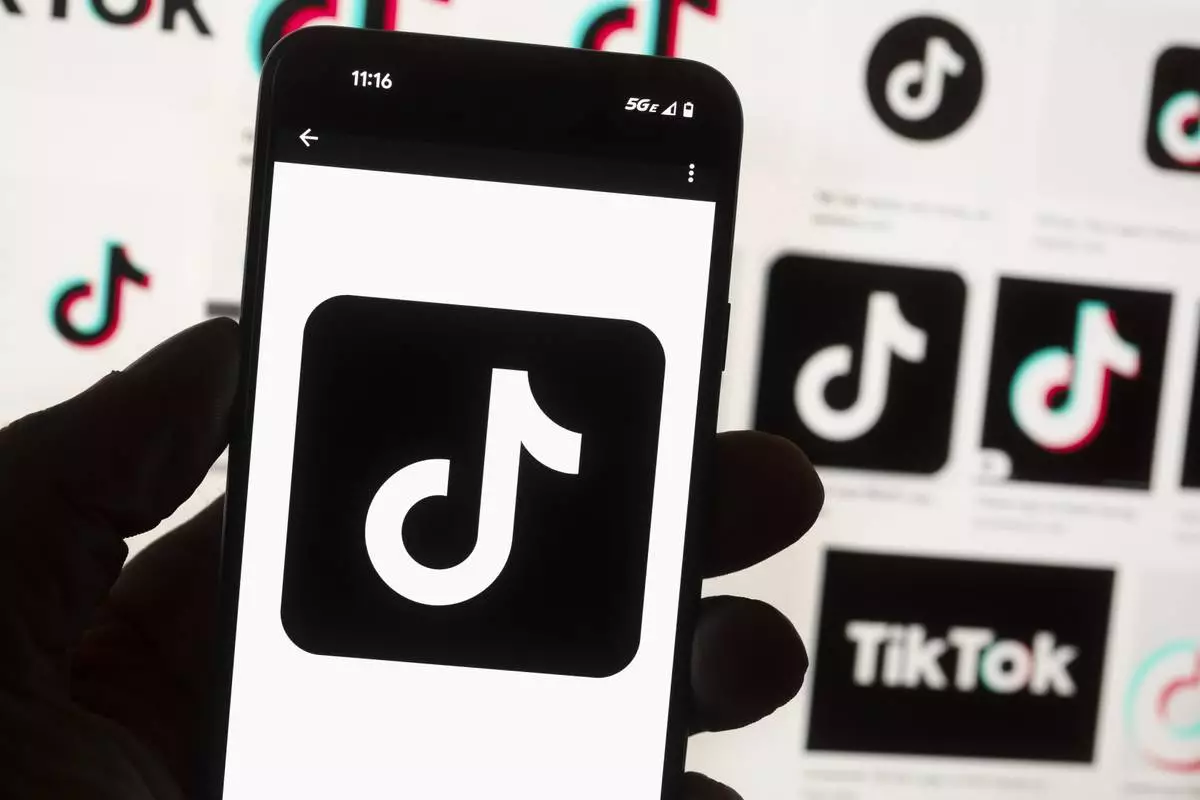
FILE - The TikTok logo is displayed on a mobile phone in front of a computer screen, Oct. 14, 2022, in Boston. TikTok is gearing up for a legal fight against a U.S. law that would force the social media platform to break ties with its China-based parent company or face a ban. A battle in the courts will almost certainly be backed by Chinese authorities as the bitter U.S.-China rivalry threatens the future of a wildly popular way for young Americans to connect online. (AP Photo/Michael Dwyer, File)
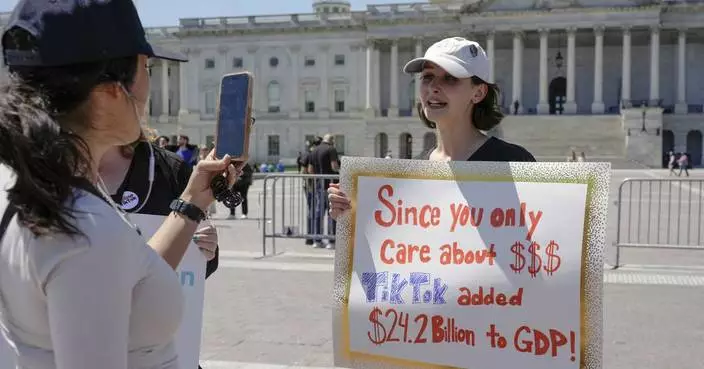
These are the countries where TikTok is already banned
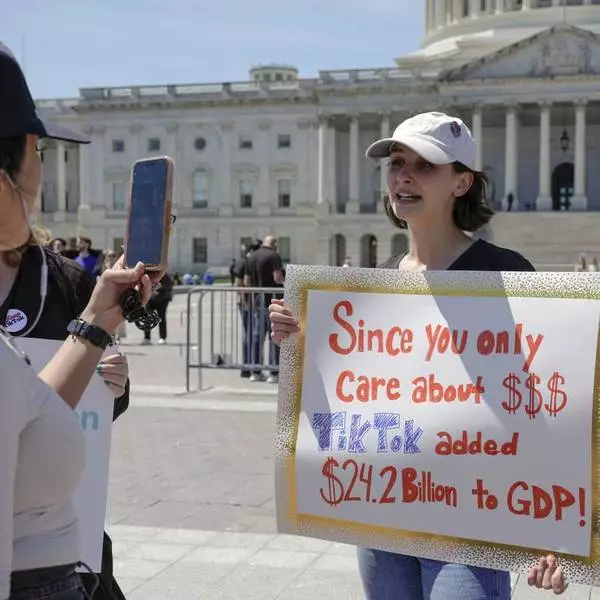
These are the countries where TikTok is already banned
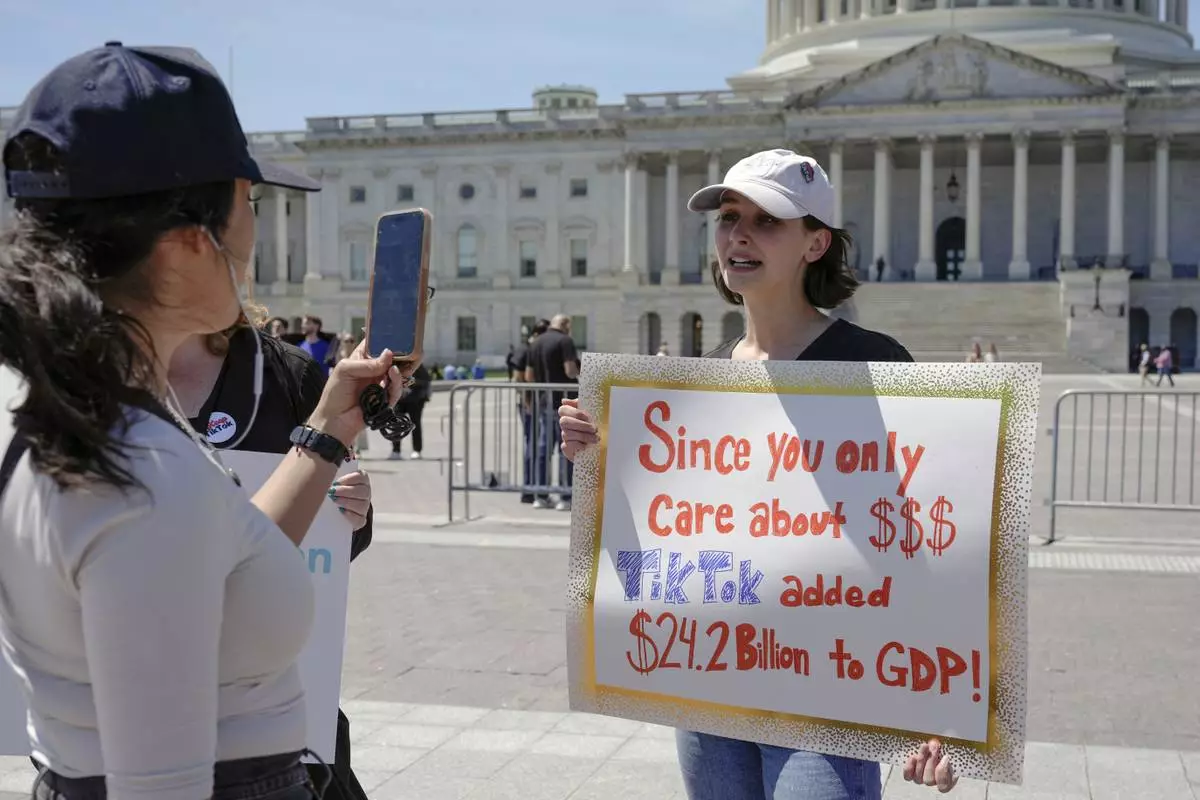
A TikTok content creator, speaks to reporters outside the U.S. Capitol, Tuesday, April 23, 2024, in Washington, as Senators prepare to consider legislation that would force TikTok's China-based parent company to sell the social media platform under the threat of a ban, a contentious move by U.S. lawmakers. (AP Photo/Mariam Zuhaib)











